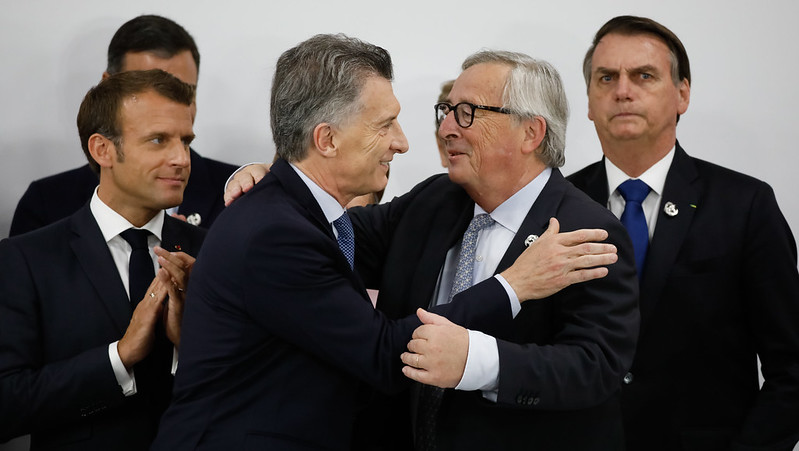The EU-Mercosur trade agreement: can a trade treaty be greened?

Introduction
This blog is reposted from the Institute for Sustainable Development and International Relations (IDDRI). It was initially posted just before the release of the report on thelikely impacts of the projected EU-Mercosur association agreement, delivered by the Ambec Commission set up by the French Prime minister. The author, Yann Laurans, is one of the members of this Commission, in charge of the “biodiversity” aspects.
The Commission Ambec was installed by Prime Minister Édouard Philippe in July 2019 to examine the sustainable development challenges of the draft association agreement between the European Union and Mercosur (or Mercorsul); its report should be released in the next coming days, or weeks. This agreement is part of the negotiation of so-called “new generation” trade agreements between the European Union and various partners (United States, Canada, Mercosur), which are regularly criticized—and questioned—for their supposed lack of environmental and social ambition. With the publication of our study on trade agreements and the presence of Yann Laurans, Director of IDDRI’s Biodiversity program, in the Ambec Commission, this blog post analyzes the conditions for a “greening” of these agreements compatible with both the legitimate expectations of civil society and the reality of trade negotiations.
EU-Mercosur Agreement and European trade policy: what potential impact(s)?
Since the initiation of discussions on the EU-Mercosur agreement in 1999, and even more so in the last six months, the political and economic context has changed significantly. Europe’s trade policy will necessarily be a key element in the search for economic recovery, in a Brussels context made even more agitated by the resignation of Trade Commissioner Phil Hogan. Moreover, economic recovery is supposed to be “green”, a commitment of the new Commission. But this will confront Europeans with many contradictions: how to ensure that the eventual recovery of their consumption does not result in staggering trade deficits? How can we not thwart the environmental commitment with imports that are harmful to the natural capital of the supplier countries, without inserting unfair and prohibited discrimination or applying protectionism that indiscriminately defends all the industrial interests of the Old Continent and closes its economy to the rest of the world?
In fact, agreements such as the one proposed with Mercosur constitute the core of European trade policy. Admittedly, each agreement of this type, taken individually, generally concerns only a very small part of the European economy (in general, less than 1% of the volumes produced by Europeans). This is, incidentally, an argument that is sometimes used to minimize the scope of a particular trade treaty, when criticism of sustainability or agricultural interests is too strong. But it is indeed through these agreements that changes are introduced in relation to the general regime of rights, quotas and rules of international trade that are also defined by the agreements at the World Trade Organization. And it is through their progressive accumulation that, in the end, the negotiated clauses produce significant inflections on the European economy.
However, European trade policy today is at risk of a form of deadlock.
On the one hand, the negotiation of agreements with third countries is the responsibility of the European Commission (without which there could be no common market); and the tactical need for the negotiation process, which requires secrecy, makes it an inherently non-transparent area of action. The Commission has the initiative, is aware of the Member States’ « red lines”, but the negotiation process takes place far from civil society and parliaments. Moreover, like many international agreements, a trade agreement resembles a Calder’s motive: each clause, percentage or quota is written into it in return for a concession on other clauses, itself negotiated beforehand in compensation for a concession, etc. Once the balance has been laboriously found, modifying one of these clauses would therefore imply renegotiating the whole; moreover, in the case of Mercosur, unanimity of the European Council, to which the question will probably be put next October, is required.
On the other hand, in response to pressure for a relative greening of its economic policy, the Commission is adding a chapter on “trade and sustainable development” to the treaties concluded since the one with South Korea in 2011 (ratified in 2015), where it concentrates the bulk of the progress and guarantees in this area, generally in the form of principles, unquantified commitments and working groups to be convened in the event of disagreements on these issues. Faced with this, the positions held on these issues by environmentalists, whether parliamentarians or NGOs, most often imply a complete reversal of practices, with free trade agreements (FTAs) at the service of sustainable development policy and Europe’s international commitments, in application, for example, of the Paris Climate Agreement. This conception remains far removed from the practice of DG Trade and the permanent representations of the Member States, which see their mission primarily as the search for additional market shares for Europeans in global competition.
This gap between the reality of trade negotiations and the expectations of sustainable development explains the stalemate that we can see today for Mercosur. The European Union Trade Treaty with Canada (CETA), as we recall, “just passed”, and it must be acknowledged that the precautions added to try to calm concerns, in the form of transatlantic consultation mechanisms, have not, since then, really reassured us. Moreover, the health crisis linked to the Covid-19 pandemic has not reconciled European opinions with free trade. And the Brazilian regime (which represents 80% of the Mercosur economy) is caught in a form of contradiction with this agreement: It is part of a program to liberalize an economy that is now one of the most closed in the world, generating rent and under-productivity, and satisfies the interests of agribusiness, which has a great deal of political power. At the same time, however, the federal government, through various political signals and the weakening of land laws, has promoted the “three Bs” (beef, bullets and the Bible), and has also revived deforestation and the destruction of indigenous peoples, which has further degraded its image among European public opinion, which is ready to hold their representatives accountable for their decisions regarding this power.
What possible outcome for the EU-Mercosur agreement?
In this context, what can the European governments, who will soon be asked to accept an agreement, do, if Germany, currently holding the Presidency of the European Council, puts this issue on a future agenda? The content of the Ambec Commission’s report will provide some clues, but these cannot be revealed before their publication. It is possible, however, project oneself into the political action that governments, parliaments and civil societies can envisage.
In the first place, a simple “no” vote, definitively burying an agreement with Mercosur, would not necessarily be a good thing for sustainable development and, in particular, for the Amazon rainforest and its peoples. Of course, a simple “yes”, without discussion, would not be either. The vast majority of environmental NGOs, representatives of the Amazonian peoples and Brazilian researchers would prefer, for example, a situation in which the EU-Mercosur dialogue, and the “carrot” of access to the European market, maintain some form of pressure on business and government, and thus obtain guarantees and a clear inflection of the policy of expansion of agricultural land. It is difficult to imagine that the precise clauses of the agreement could be modified: it would then be necessary to start from scratch, which the protagonists would probably not be ready to do.
It is therefore perhaps in the form of a new phase of dialogue, leading to specific commitments and actions, that the discussion, if it does take place, could continue, with the objective not of rewriting the agreement, but of adding another agreement, possibly another commitment mechanism or even, as proposed in the study published by IDDRI, an “investment agreement”. And this, for a change, by using the many creative resources of civil society, businesses and parliamentarians, as well as the recommendations contained in the reports of the various commissions and experts who have studied the issue. This would be an exemplary evolution of European trade policy, which would not disown the architects of this historic agreement, but would add to it a kind of second floor, hopefully more democratic and sustainable.

Comments
There is no contentYou must be logged in to reply.